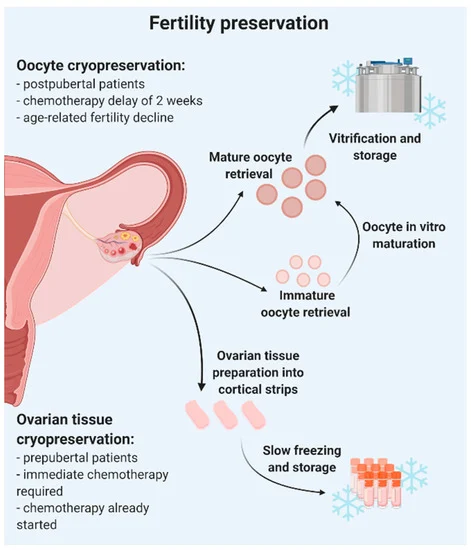Fertility Preservation Tourism: Preserving Your Future Family

Are you considering starting a family in the future but worried about your fertility? Have you considered fertility preservation tourism as a way to ensure your future family dreams can become a reality?
Fertility preservation tourism is a growing trend that offers individuals the opportunity to freeze their eggs, sperm, or embryos for future use. Advancements in reproductive technology have made it possible to preserve fertility for individuals who are not ready to start a family yet or who may face fertility challenges due to medical treatments or conditions.
Egg freezing, sperm freezing, and embryo freezing are the most common methods used for fertility preservation. While these services are available in many countries, fertility preservation tourism offers individuals the opportunity to access these services abroad, often at a lower cost.
In this article, we will explore the world of fertility preservation tourism and help you determine if it is the right option for you.
Key Takeaways
- Fertility preservation tourism offers a cost-effective option for individuals looking to freeze eggs, sperm, or embryos for future use.
- Legal and ethical considerations, as well as potential language barriers and lack of regulation in different countries, need to be taken into account.
- Methods such as egg freezing, sperm freezing, and embryo freezing, as well as in vitro fertilization (IVF) and genetic testing, are commonly used for fertility preservation.
- Factors such as cost, quality standards, legal protections, and language barriers should be considered when choosing a fertility preservation clinic abroad.
Understanding Fertility Preservation Tourism
If you’re thinking about fertility preservation, you might want to consider fertility preservation tourism. It’s an option that allows you to combine a vacation with preserving your future family.
Fertility preservation tourism is a growing trend where people travel to other countries to undergo fertility treatments. These treatments can include egg freezing, sperm freezing, and embryo freezing.
One of the main reasons people seek fertility preservation tourism is because the cost of fertility treatments can be prohibitive in their home country. By traveling to another country, they can often find lower costs for the same treatments. Additionally, some countries offer treatments that aren’t available in the traveler’s home country.
However, it’s important to research the laws and regulations in the destination country to ensure the safety and legality of the treatments.
Advancements in Reproductive Technology
You can now take advantage of the latest developments in reproductive technology to increase your chances of starting a family when the time is right for you. One of the biggest advancements in this field is in vitro fertilization (IVF), a process that involves fertilizing an egg with sperm outside the body.
IVF has become increasingly popular as a way for couples struggling with infertility to conceive, but it can also be used for fertility preservation. Women can freeze their eggs or embryos, which can then be thawed and used in an IVF cycle when they’re ready to start a family.
Another exciting development in reproductive technology is social egg freezing, which allows women to freeze their eggs for non-medical reasons. This gives women the flexibility to delay having children until they’re ready, without worrying about their biological clock ticking away.
Additionally, advancements in genetic testing have made it possible to screen embryos for genetic disorders and select the healthiest embryos for implantation. This not only increases the chances of a successful pregnancy but also reduces the risk of passing on genetic diseases to future generations.
With these advancements in reproductive technology, fertility preservation has never been more accessible or effective.
Egg Freezing: Preserving Female Fertility
Get ready to experience the ultimate freedom with egg freezing – a revolutionary method that allows women to delay motherhood until they’re ready. With this procedure, you can preserve your fertility and focus on your personal and professional goals without worrying about time running out.
Here are some benefits of egg freezing that you might find interesting:
- You can freeze your eggs at any age, but the younger you are, the better your chances of success.
- You can store your eggs for up to 10 years or longer, giving you the flexibility to start a family whenever you want.
- Egg freezing is a minimally invasive and safe procedure that doesn’t affect your hormone levels or menstrual cycle.
- Egg freezing can be a good option for women who want to preserve their fertility due to medical reasons, such as cancer treatment.
By choosing to freeze your eggs, you’re taking control of your reproductive future and giving yourself options that weren’t available before. Whether you want to focus on your career, travel the world, or simply wait for the right partner, egg freezing can give you the peace of mind you need to make the best decisions for yourself.
Sperm Freezing: Preserving Male Fertility
Imagine being able to freeze your little swimmers for a rainy day, allowing you the freedom to focus on your personal and professional goals without worrying about time running out.
Sperm freezing, also known as cryopreservation, is a technique used to preserve a man’s sperm for future use. It is a simple and safe procedure that involves collecting and freezing a man’s semen sample, which can later be thawed and used for insemination or in vitro fertilization (IVF) when needed.
Sperm freezing is a popular option for men who are facing fertility-threatening conditions such as cancer, or for those who want to delay starting a family. It is also a good option for men who are planning to undergo a vasectomy, as it allows them to have a backup plan in case they change their minds in the future.
Sperm freezing is a reliable and effective way to preserve male fertility, and it gives men the peace of mind they need to pursue their life goals without putting their future family plans on hold.
Embryo Freezing: Preserving Fertility for Couples
Embryo freezing is a viable option for couples who want to expand their family in the future but aren’t ready to do so at present. This process involves fertilizing the female partner’s eggs with the male partner’s sperm and then freezing the resulting embryos.
The embryos can then be thawed and implanted into the female partner’s uterus at a later time when the couple is ready to conceive. Embryo freezing is often utilized by couples who are undergoing fertility treatments such as in vitro fertilization (IVF) and have extra embryos that are not needed for their current cycle.
It allows couples to preserve their fertility and increase their chances of having a successful pregnancy in the future. Embryo freezing also provides a sense of peace of mind for couples who may be facing medical procedures or treatments that could affect their fertility. By preserving their embryos, they can maintain control over their reproductive future and have the option to start a family when they’re ready.
Accessing Fertility Preservation Services Abroad
If you and your partner have decided to preserve your fertility through embryo freezing, you may be wondering where to access this service. While there are many reputable clinics in your home country, you may also consider accessing fertility preservation services abroad. In some cases, this can be a more cost-effective option, especially if you live in a country with high healthcare costs or limited insurance coverage for fertility treatments.
However, it’s important to carefully research and consider your options before pursuing fertility preservation abroad. You’ll want to ensure that the clinic you choose meets high standards of safety and quality, and that you have a clear plan for follow-up care and communication with your home healthcare provider. To help you evaluate your options, consider the following table comparing key factors to consider when choosing a fertility preservation clinic abroad versus in your home country:
| Factor | Home Country | Abroad |
|---|---|---|
| Cost | May be higher due to healthcare costs and insurance limitations | May be lower due to exchange rates and lower healthcare costs |
| Quality Standards | Generally regulated and monitored by government agencies | Standards may vary and require additional research |
| Legal Protections | Generally well-established and enforced | May vary and require additional research |
| Language and Cultural Barriers | Likely minimal | May require additional planning and support |
By carefully considering these factors, you can make an informed decision about whether accessing fertility preservation services abroad is the right choice for you and your partner. And by taking the time to research and prepare, you can ensure that you have the best possible chance of success in preserving your future family.
Cost Considerations for Fertility Preservation Tourism
Planning a trip to freeze your eggs or sperm abroad can be a cheaper option, but it’s important to consider the associated costs.
While the cost of fertility preservation services varies depending on the country and clinic, you should also factor in other expenses such as travel, accommodation, and meals. Additionally, there may be hidden costs such as medical tests, consultations, and medications, which can significantly increase the overall expenses.
To avoid any surprises, it’s essential to do your research and budget accordingly. Look for clinics that offer comprehensive packages that include all the necessary services, and compare prices between different countries and clinics.
Don’t forget to factor in the cost of shipping your eggs or sperm back to your home country, as well as any legal fees or customs charges that may apply.
By being proactive and informed, you can make the most of fertility preservation tourism and preserve your future family without breaking the bank.
Legal and Ethical Considerations
Now that you have an idea of the costs involved in fertility preservation tourism, let’s talk about some important legal and ethical considerations to keep in mind.
When it comes to fertility preservation, there are several legal and ethical issues that need to be taken into account. These issues can vary depending on the country you are visiting and where you plan to use your preserved gametes or embryos.
To help you better understand the legal and ethical considerations of fertility preservation tourism, here are some important points to keep in mind:
- Legal regulations: Different countries have different regulations when it comes to fertility preservation. It’s important to research and understand the laws of the country you plan to visit, as well as the laws of your home country, to ensure that everything is done legally.
- Informed consent: It’s important to fully understand the process of fertility preservation and the potential risks and benefits involved. Make sure you receive thorough information and have the opportunity to ask questions before moving forward.
- Embryo ownership: In some cases, the ownership of embryos can become a legal issue. It’s important to understand the laws of the country where the embryos are stored and where they will be used, to ensure that ownership is clear.
By keeping these legal and ethical considerations in mind, you can make informed decisions about your fertility preservation journey and ensure that everything is done safely and legally.
Is Fertility Preservation Tourism Right for You?
Deciding whether or not to pursue overseas fertility preservation can be a complex and personal choice, influenced by factors such as cost, accessibility, and personal beliefs. It’s important to weigh the benefits and risks of undergoing fertility preservation abroad before making a decision.
If you’re considering fertility preservation tourism, it’s important to ask yourself if the potential benefits outweigh the potential drawbacks. Some benefits of pursuing overseas fertility preservation may include lower costs and access to cutting-edge technology. However, there are also risks to consider, such as potential language barriers, lack of regulation, and limited legal recourse in case of malpractice.
Ultimately, the decision to pursue fertility preservation abroad should be based on your individual circumstances and preferences.
Frequently Asked Questions
Are there any risks or side effects associated with fertility preservation procedures?
You may experience some discomfort from the procedures, such as bloating or cramping. There is also a small risk of infection or bleeding. However, the benefits of preserving your fertility may outweigh these risks.
How long can frozen eggs, sperm or embryos be stored and still be viable for use?
Frozen eggs, sperm, and embryos can be stored for many years and retain their viability. The length of storage depends on the facility and the method used. Consult with your fertility clinic for specific guidelines.
Can fertility preservation procedures affect future pregnancies or childbirth?
Fertility preservation procedures typically do not affect future pregnancies or childbirth. However, there are potential risks such as multiple pregnancies or ovarian hyperstimulation syndrome. Discuss these risks with your doctor before proceeding with the procedure.
Is there a difference in the success rate of fertility preservation procedures performed abroad compared to those performed domestically?
Choosing to have fertility preservation procedures performed abroad may not guarantee a higher success rate compared to domestically. It’s important to thoroughly research the clinic and country’s regulations to ensure quality and safety.
Are there any lifestyle changes or precautions that need to be taken after undergoing fertility preservation procedures?
After undergoing fertility preservation procedures, you may need to make some lifestyle changes and take precautions to ensure the best chance of success. This could include avoiding certain medications, maintaining a healthy weight, and avoiding smoking and alcohol.
Conclusion
So, is fertility preservation tourism right for you? Only you can answer that question. It ultimately depends on your personal circumstances and goals for starting a family. If you’re considering fertility preservation, it’s important to do your research and consult with a medical professional to determine the best options for you.
While fertility preservation is still a relatively new field, advancements in reproductive technology have made it more accessible and effective than ever before. Whether you choose to pursue fertility preservation abroad or in your home country, it’s important to weigh the legal, ethical, and financial considerations before making a decision.
With careful planning and consideration, fertility preservation tourism can offer hope and the potential for a brighter future for those looking to start or expand their families.









